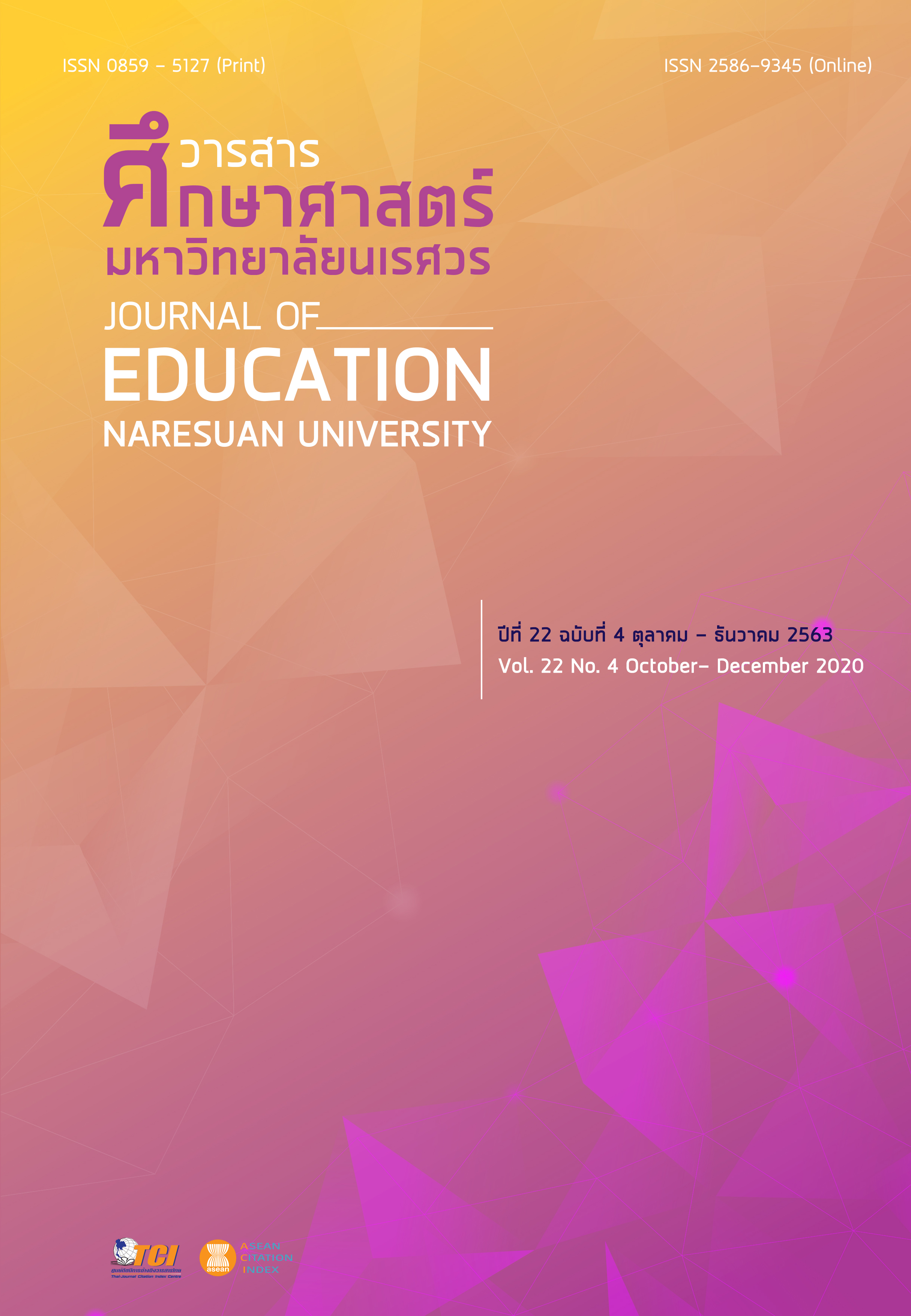A USE OF COOPERATIVE LANGUAGE LEARNING TO ENHANCE ENGLISH READING ABILITY AND EMOTIONAL QUOTIENT AMONG GRADE 8 STUDENTS การใช้การเรียนภาษาแบบร่วมมือเพื่อเพิ่มพูนความสามารถในการอ่านภาษาอังกฤษและความฉลาดทางอารมณ์ ของนักเรียนระดับชั้นมัธยมศึกษาปีที่ 2
Main Article Content
Abstract
The purposes of this research were 1) to compare students’ English reading ability before and after learning through cooperative language learning, and 2) to compare students’ emotional quotients before and after learning through cooperative language learning. The target group was 15 Matthayom Suksa 2 students studying English (E22102) at Wat Huay Kaew School, Mae On District, Chiang Mai. The experimental instruments were 7 lesson plans using cooperative language learning. Each lesson plan contained 3 periods and each period lasted 60 minutes. The data collection instruments were the English reading ability test and emotional quotient test. The research procedures comprised of testing students’ English reading ability and the emotional quotients before and after through these 7 lesson plans. The data were analyzed for mean, standard deviation and percentage. The findings were as follows:
1. The students’ English reading ability was higher after learning through cooperative language learning.
2. The students’ emotional quotients were higher after learning through cooperative language learning.
Article Details
The owner of the article does not copy or violate any of its copyright. If any copyright infringement occurs or prosecution, in any case, the Editorial Board is not involved in all the rights to the owner of the article to be performed.
References
Banluekhet, S. (2011). The development of promoting reading habits using 5-step supervision. Journal of Education, 14(1), 37-38. [in Thai]
Bureau of Academic Affairs and Educational Standards. (2014). Educational measurement, assessment and evaluation (4th ed.). Bangkok: The Agriculture Cooperative Federation of Thailand. [in Thai]
Department of Mental Health. (2003). Emotional quotient. Retrieved May 12, 2003, from https://www.dmh.go.th/ebook/dl.asp?id=10 [in Thai]
DeVries, D. L., Edwards, J. J., & Wells, E. H. (1974). Teams – games – tournament in the social studies classroom: Effects on academic achievement, student attitudes, cognitive beliefs, and classroom climate, report No. 173. Baltimore: Center for Social Organization, The Johns Hopkins University.
Duangloy, M. (2015). Factors affecting English reading problems of students in Rajamangala University of Technology Krungthep. Journal of Technical Education Rajamangala University of Technology Thanyaburi, 3(1), 153-167. [in Thai]
Johnson, D. W., & Johnson, R. T. (1994). R.T. learning together and alone: Cooperative, competitive, and individualistic learning (4th ed.). USA: Allyn and Bacon.
Johnson, D., Johnson, R., & Holubec, E. (1994). Cooperative learning in the classroom. Alexandria, Va.: Association for Supervision and Curriculum Development.
Khammani, T. (2005). Teaching theory: Knowledge for effective learning process. Bangkok: Chulalongkorn University Printing House. [in Thai]
Khunphanuk, P., & Khanto S. (2012). The development of English reading and writing activities for Prathom Suksa 6 students using cooperative learning model: STAD Technique. Journal of Education Khon Kean University, 6(1). 79-86. [in Thai]
Krumram, S., Srisanyong, S., & Singlop, S. (2016). A study effect of CIPPA concept together with STAD technique to develop biological learning achievement on genetic and science process skills for Mathayomsuksa IV students. Journal of Education Naresuan University, 18(2), 202-211. [in Thai]
Olsen, R., & Kagan, S. (1992). About cooperative learning. In C. Kessler (ed.), Cooperative Language Learning: A Teacher’s Resource Book. New York: Prentice Hall.
Phayuha, P. (2014). Use of jigsaw reading to promote English reading, summary writing abilities and social skills among Mathayom Suksa 4 students. Phikanatesan Journal, 10(1), 137-148. [in Thai]
Phuwipadawan, S. (2001). Learner centeredness and authentic assessment (3rd ed.) Chiang Mai: The Knowledge Center. [in Thai]
Richards, J., & Rodgers, T. (2001). Cooperative language learning. In Approaches and Methods in Language Teaching (pp. 192-203). Cambridge: Cambridge University Press. doi:10.1017/CBO9780511667305.020
Slavin, R. E. (1978). STAD. Journal of Research and Development in Educational, 60(7), 42-48.
Slavin, R. E. (1995). Cooperative learning theory, research and practice (2nd ed.). Massachusetts: Macmillan Publishing Company.
Taotayong, A., & Kuha, A. (2011). Effects of cooperative learning by using CIRC program on writing and reading ability on English language achievement of bilingual students. Princess of Naradhiwas University Journal, 3(2), 65-80. [in Thai]
Thongdee, S. (1999). Introduction to human behavior. Journal of Man and Society, 1(5), 41-91. [in Thai]
Watthana, W. (2014). Learning management by using SQ3R reading technique to develop reading comprehension and study English reading behavior of Prathom suksa 6 students of Wattaponnoi School in Changwat Chanthaburi (Master thesis). Chonburi: Burapha University. [in Thai]
Williams, E. (1994). Reading in the Language Classroom (8th ed.). London: MacMillan.


